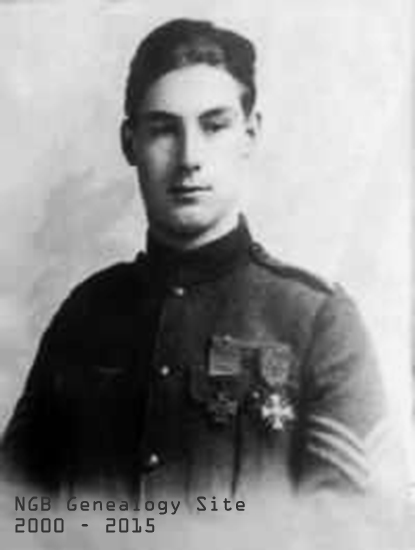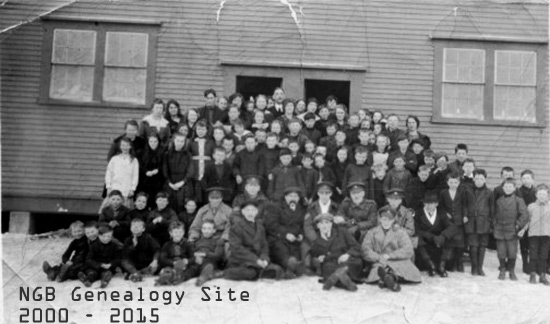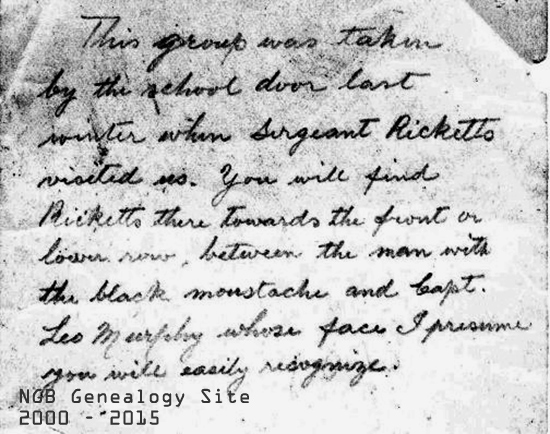Presented by the
Newfoundland's Grand Banks Site
to assist you in researching your Family History
Click on the graphic below to return to the NGB Home Page
To contribute to this site, see above menu item "About".
These transcriptions may contain human errors.
As always, confirm these, as you would any other source material.
This page is dedicated to Sgt Thomas Ricketts V.C.
Researched by Dan Breen and Terry Hissey
 Sgt Thomas Ricketts
Sgt Thomas Ricketts
|
Thomas
Ricketts was born on 15th of April 1901 in Middle Arm, White Bay,
Newfoundland, the son of John and Amelia (nee Castle). Thomas was a
fisherman by trade but when war broke out in Europe, he travelled to St.
John's where he enlisted in the Royal Newfoundland Regiment on the 2nd
September 1916. He stated that he was 18 yrs and 3 months old when in fact
he was 15 yrs and 4 months. He was assigned Regimental # 3102 and left St.
John's on 31st January 1917 onboard the SS Florizel eventually destined
for Windsor, England. He embarked at Southampton for the British
Expeditionary Force on 11th June and joined the Newfoundland Battalion on
the 2nd July at Rouen, France. Wounded at Cambrai on the 20th November
with a Gun Shot Wound to the left leg, he was invalided to England and
admitted to the 1st London General Hospital on 28th November. Whilst on
furlough he was attached to 24 Company Depot on 19th December. He embarked
for France on the 4th April 1918 and rejoined the Newfoundland Battalion
in the field on the 30th April.
The award of the Victoria Cross, for actions during the advance from Ledgehem, Belgium on 14th October 1918, was published on p. 309 of London Gazette No. 31108, dated 6th January 1919. The citation read: |
| "No. 3102 Pte. Thomas
Ricketts, 1st Bn., R. Newfoundland R. For most conspicuous bravery and devotion to duty on the 14th October, 1918, during the advance from Ledgehem, when the attack was temporarily held up by heavy hostile fire and the platoon to which he belonged suffered severe casualties from the fire of a battery at point-blank range. Pte. Ricketts at once volunteered to go forward with his section commander and a Lewis gun to attempt to outflank the battery. Advancing by short rushes under heavy fire from enemy machine guns with the hostile battery, their ammunition was exhausted when still 300 yards from the battery. The enemy, seeing an opportunity to get their field guns away, began to bring up their gun teams. Pte. Ricketts at once realising the situation, doubled back 100 yards under the heaviest machine-gun fire, procured further ammunition, and dashed back again to the Lewis gun, and by very accurate fire drove the enemy and the gun teams into a farm. His platoon then advanced without casualties, and captured the four field guns, four machine guns, and eight prisoners. A fifth field gun was subsequently intercepted by fire and captured. By his presence of mind in anticipating the enemy intention and his utter disregard of personal safety, Pte. Ricketts secured the further supply of ammunition which directly resulted in these important captures and undoubtedly saved many lives." |
|
After the above statement was released, Thomas
Ricketts became a "much-sought-after" person in England and at home in
Newfoundland.
On 18th January, 1919, Thomas received
a message informing him that he was to be invested with the Victoria Cross
by the King:
The award of the Croix de Guerre avec Etoile d’Or at was published without citation on p. 7813 of The London Gazette No. 31409 dated 19th June 1919. On September 27th 1918, Pte Thomas Ricketts was presented with the Croix de Guerre avec Etoile d’Or at Holickshen by Lieutenant General Sir Claud Jacob KCB, Commander of the Second Army Corps. Despite many sources stating that he was awarded the Distinguished Conduct Medal this is not so. This error was made in 1919 by the Pay & Records Office of the Newfoundland Contingent. The day after receiving the above message, Thomas met the King. Below is an excerpt from the Daily Mirror dated 21st January 1919: “I am returning home immediately,”
explained the fresh- faced, fair-haired young soldier modestly, “so
it was arranged that the King should give me the Cross privately,
so that I should not have to wait for a full investiture.
Thomas was promoted to Sergeant on 29th January 1919 and the next day he boarded the SS Corsican in Liverpool and sailed for Newfoundland. On the 1st June he formally left the army. Thomas resumed his schooling and eventually opened a Pharmacy on the corner of Job and Water Streets in St. John's. The pharmacy is gone but in it's place stands a memorial to him. He married Edna Edwards and they had a son and daughter. Thomas died on the 10th February 1967 aged 65 and was buried in the Anglican Cemetery on Forest Road, St. John's, Newfoundland.
|
Return to the Main Military Records Index
Military Records Contact: Sherwin Flight
Newfoundland's Grand Banks is a non-profit endeavor.
No part of this project may be reproduced in any form
for any purpose other than personal use.
JavaScript DHTML Menu Powered by Milonic
© Newfoundland's Grand Banks (1999-2025)
Hosted by
![]()
Your Community, Online!
![[Recent]](../../recent.gif)
![[Home]](../../home.gif)

